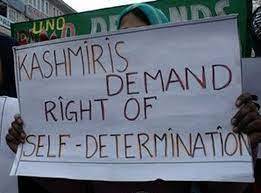Proposed amendments to India’s Waqf Act: A direct assault on Muslim autonomy, religious freedom
Humayun Aziz Sandeela

The Indian government’s plan to introduce The Waqf (Amendment) Bill, 2024 in the parliament, to further amend The Waqf Act, 1995, has ignited widespread concern, among the Muslim community across India particularly Indian illegally occupied Jammu and Kashmir. These proposed changes, which are purportedly aimed at improving the administration of waqf properties, are widely seen as a direct attack on the autonomy of Muslim institutions and a blatant infringement on religious freedoms.
Muslim bodies, including the All India Muslim Personal Law Board, the Jamiat Ulama-i-Hind, and senior leader of All Parties Hurriyat Conference Mirwaiz Umar Farooq, have strongly opposed the proposed legislation.
As reported by Economic Times of India Waqf boards control 8.7 lakh properties spanning 9.4 lakh acres across India, with an estimated value of Rs 1.2 lakh crore.
At the core of the controversy is a proposal that requires any individual seeking to designate their property as waqf (a charitable endowment under Islamic law) to have been a Muslim for at least five years. This provision not only imposes an arbitrary restriction but also discriminates against Muslims by creating an unnecessary barrier to the religious practice of waqf. Islam mandates that waqf properties be dedicated to charitable and religious purposes, and imposing a time-based criterion on a fundamental religious practice is both unprecedented and absurd.
The five-year requirement effectively limits the ability of new or recent Muslims to engage in this religious duty, reflecting a lack of respect for the religious practices and beliefs of the Muslim community. By imposing such a precondition, the amendments undermine the autonomy of Muslim individuals and institutions in managing their religious endowments according to their faith.
Another deeply troubling aspect of the proposed amendments is the shift of authority from waqf boards to district collectors in disputes over waqf properties. Under the new bill, a district collector, a government official, would have the final say in determining whether a piece of land is waqf property or government land. This move centralizes power in a non-religious and non-community authority, stripping waqf boards of their traditional role in adjudicating matters related to waqf properties.
This shift introduces a dangerous precedent, risking the politicization of waqf property management and opening the door to potential misuse of authority. Decisions that were once made by boards with religious and community insights are now subject to bureaucratic processes, which could lead to mismanagement and unfair treatment of waqf assets. This not only undermines the expertise and autonomy of waqf boards but also raises concerns about potential conflicts of interest and corruption.
The proposed amendments also include provisions for altering the composition of waqf boards by including non-Muslims in their ranks. Under these changes, non-Muslims could even be appointed as the CEO of a waqf board. This is a direct intrusion into religious matters, as the management of waqf properties is fundamentally a religious and cultural responsibility of the Muslim community.
The inclusion of non-Muslims, particularly in leadership positions, poses serious issues. It could lead to decisions that do not align with Islamic principles, undermining the religious integrity of waqf institutions. Effective management of waqf properties requires a deep understanding of Islamic law and the specific needs of the Muslim community. Appointing individuals who lack this understanding could jeopardize the preservation of these vital religious assets.
The timing and nature of these proposed amendments suggest a broader political agenda aimed at disempowering Muslims and using them as political pawns. The amendments appear to be part of a strategy to polarize communities and consolidate electoral support through divisive policies, especially with the Indian government likely to organize legislative assembly polls in the occupied territory. By undermining the autonomy of Muslim institutions and interfering in religious matters, the government seems intent on creating a narrative that marginalizes Muslim voices and reinforces sectarian divides.
In occupied Jammu and Kashmir, where waqf properties include mosques, shrines, and Khanqas that are integral to the region’s religious and cultural identity, the proposed amendments are particularly alarming. The imposition of new regulations and oversight mechanisms disrupts local management and threatens the preservation of these properties. Increased government intervention and bureaucratic control over religious sites could lead to their mismanagement and degradation, risking the destabilization of communities and exacerbating existing grievances.
The Muslim community in occupied Jammu and Kashmir, already facing numerous challenges and political instability, is especially vulnerable to these amendments. The changes could erode local autonomy and weaken religious institutions that have long been pillars of community support and identity.
The proposed amendments to India’s Waqf Act echo a troubling historical pattern where legislative measures have been used to curtail religious freedoms and minorities’ disempowerment. Similar strategies have been employed throughout history with devastating consequences. For instance, the Penal Laws (1695–1829) in Ireland targeted Catholics, restricting their rights to own property and practice their religion, aiming to consolidate Protestant control. In the Russian Empire (1882), the May Laws marginalized Jews by restricting their settlement and property rights, leading to widespread poverty and emigration. Under Apartheid South Africa (1948–1991), laws enforced racial segregation and suppressed indigenous religious practices, marginalizing non-Christian communities. The Chinese Exclusion Act (1882) in the U.S. targeted Chinese immigrants, restricting their religious and cultural practices amid rising xenophobia. Finally, the Indian Caste Disabilities Removal Act (1850), though intended to protect converts’ rights, was perceived as an imposition of Western values, further polarizing Hindu society.
These historical citations illustrate how legislative measures have been used to target religious minorities, often with devastating consequences. The proposed amendments to India’s Waqf Act, which could undermine the autonomy of Muslim institutions and restrict religious freedoms, fit into this broader historical pattern of using legal frameworks for disempowerment of religious minorities.
The proposed amendments to India’s Waqf Act represent a troubling development that threatens the religious autonomy and cultural heritage of the Muslim community. It is crucial for the Indian government to reconsider these amendments and engage in constructive dialogue with the Muslim community to ensure their religious and cultural rights are respected.








